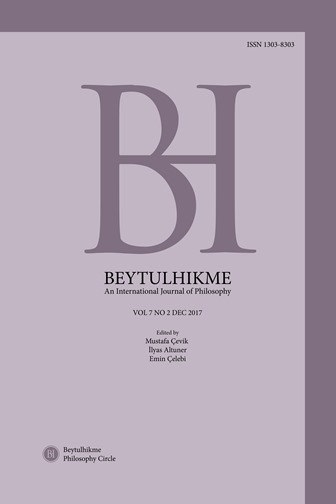Kripke’de Özel Adlar, Fiziksel Durumlar ve Zihinsel Durumlar İçin İleri Sürülen Özdeşlik Tezi Tartışması
Author :
Abstract
Bu çalışmada, Kripke’nin olanaklı dünyalar argümanı çerçevesinde zihinsel süreçlerin fiziksel olaylara indirgenerek özdeşleştirilmesinin zorunlu bir dayanağı olmadığı iddiası ele alınmıştır. Fizikalizm ve özdeşlik kuramları, zihinsel süreçleri tümüyle fiziksel bir şekilde, dolayısıyla onu fizikî olana indirgemeye çalışarak beyin olayları ile açıklamayı amaçlamaktadır. Kripke’ye göre ise, zihinsel durumların, fiziksel durumlarla özdeşleştirilmesi için bir zorunluluk söz konusu olmalıdır. Ancak ona göre, fiziksel olayların zihinsel süreçleri zorunlu olarak ortaya çıkardığını göstermek mümkün değildir. Kripke’ye göre, bir ifadenin zorunlu olarak doğru olabilmesi için tüm olanaklı dünyalarda doğru olması gerekir. Kripke, bu durumu anlatmak için “katı belirtici” (rigid designator) kavramını kullanır. Kripke’ye göre katı belirticiler arasındaki özdeşlik tezleri metafizik olarak zorunlu doğru olmalıdır. Bu durum zihinsel olaylar için geçerli değildir. Şu halde makalenin amacı, Kripke açısından fiziksel ve zihinsel durumların açıklanmasında ileri sürülen özdeşlik tezinin neden geçerli olmadığının ortaya konulmasıdır.
Keywords
Abstract
In this study, Kripke's claim, that within the framework of the possible worlds argument, the identification of mental processes by being reduced to physical events doesn't have an imperative base is addressed. Theories of physicalism and identity aims to explain the mental processes in a thoroughly physical way, thus trying to reduce it to the physical one, through brain events. According to Kripke, there must be an imperativeness for the identification of mental states with physical states. According to him, however, it is not possible to show that physical events necessarily reveal mental processes. According to Kripke, in order to be imperatively correct for one statement, it must be correct in all possible worlds. Kripke uses the concept of "rigid designator" to describe this situation. According to Kripke, the thesis of identity between rigid designators must be metaphysically imperative correct. This situation does not apply to mental events. So then, the aim of this article is to reveal why the thesis of identity proposed in the explanation of physical and mental situations in terms of Kripke is not valid.
Keywords
- Baykent, U. Ö. (2017). Dil Felsefesinde Anlam Sorunu. The Journal of Academic Social Science Studies, 56 (3), 497-508.
- Churchland, P. M. (2012). Madde ve Bilinç: Zihin Felsefesine Güncel Bir Bakış (çev. B. Ersöz). İstanbul: Alfa Yayınları.
- Güçlü, A. vd. (2008). Felsefe Sözlüğü. Ankara: Bilim ve Sanat Yayınları.
- Günday, Ş. (2003). Zihin Felsefesi. Bursa: Asa Kitabevi.
- İnan, İ. (2012). Dil Felsefesi. Eskişehir: Anadolu Üniversitesi Açıköğretim Fakülte- si Yayınları.
- Kripke, S. (2005). Adlandırma ve Zorunluluk (çev. B. Açıl). İstanbul: Litera Yayın- cılık.
- Levine, J. (1983). Materialism and Qualia: the Explanatory Gap. Pacific Philosophi- cal Quarterly, 64, 354-361.
- Priest, S. (1991). Theories of the Mind. London: Penguin Books.
- Putnam, H. (1973). Meaning and Reference. The Journal of Philosophy, 70 (19), Seventieth Annual Meeting of the American Philosophical Association Eastern Division. Nov. 8, pp. 699-711.
- Revonsuo, A. (2016). Bilinç: Öznelliğin Bilimi (çev. S. Değirmenci). İstanbul: Küre Yayınları.
- Rossi, J. G. (2001). Analitik Felsefe (çev. A. Altınörs). İstanbul: Paradigma Yayınla- rı.
- Searle, J. R. (2004). Zihnin Yeniden Keşfi (çev. M. Macit). İstanbul: Litera Yayınla-
- Shaffer, J. A. (2005). Zihin Felsefesi (çev. T. Koç). İstanbul: İz Yayıncılık.
- Soames, S. (2003). Philosophical Analysis in the Twentieth Century, vol. 2. Princeton, New Jersey: Princeston University Press.
- Speaks, J. (2007). A Guide to Kripke’s Attack on Descriptivism in Lectures I & II of Naming & Necessity. January 24.
- Tura, S. M. (2010). Madde ve Mana: Rasyonalitenin Kökeni. İstanbul: Metis Yayın- ları. Öz: Bu çalışmada, Kripke’nin olanaklı dünyalar argümanı çerçevesinde zihinsel süreçlerin fiziksel olaylara indirgenerek özdeşleştirilmesinin zorunlu bir dayanağı olmadığı iddiası ele alınmıştır. Fizikalizm ve özdeşlik kuramları, zihinsel süreçleri tümüyle fiziksel bir şekilde, dolayısıyla onu fizikî olana indirgemeye çalışarak beyin olayları ile açıklamayı amaçlamaktadır. Kripke’ye göre ise, zihinsel durumların, fiziksel durumlarla özdeşleştirilmesi için bir zorunluluk söz konusu olmalıdır. Ancak ona göre, fiziksel olayların zihinsel süreçleri zorunlu olarak ortaya çıkardığını göstermek mümkün değildir. Kripke’ye göre, bir ifadenin zorunlu olarak doğru olabilmesi için tüm olanaklı dünyalarda doğru olması gerekir. Kripke, bu durumu anlatmak için “katı belirtici” kavramını kullanır. Kripke’ye göre katı belirticiler arasındaki özdeşlik tezleri metafizik olarak zorunlu doğru olmalıdır. Bu durum zihinsel olaylar için geçerli değildir. Şu halde makalenin amacı, Kripke açısından fiziksel ve zihinsel durumların açıklanmasında ileri sürülen özdeşlik tezinin neden geçerli olmadığının ortaya konulmasıdır. Anahtar Kelimeler: Kripke, özdeşlik, özel adlar, zihinsel ve fiziksel durumlar, katı belirticiler.
